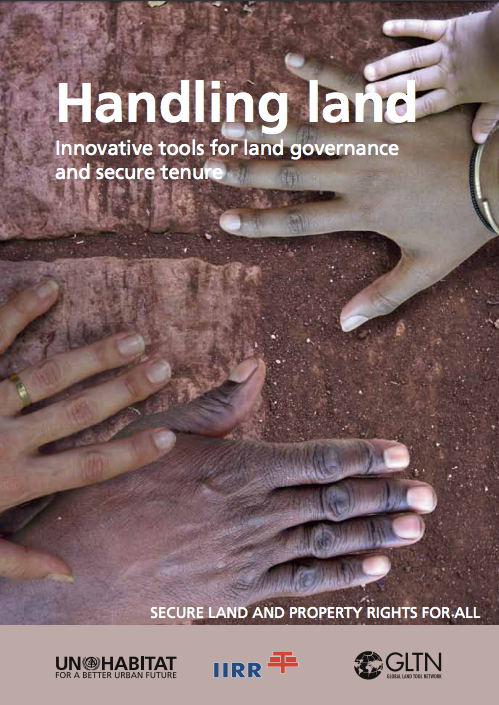Focal point
Location
The Global Land Tool Network (GLTN) is an alliance of global regional and national partners contributing to poverty alleviation through land reform, improved land management and security of tenure particularly through the development and dissemination of pro-poor and gender-sensitive land tools.
Secure land tenure and property rights are fundamental to shelter and livelihoods as well as the realisation of human rights, poverty reduction,economic prosperity and sustainable development.
The Global Land Tool Network (GLTN) main objective therefore is to contribute to poverty alleviation and the Millennium Development Goals through land reform, improved land management and security of tenure.
UN-Habitat through GLTN continues to work towards this with partners who include international civil society organizations, international finance institutions, international research and training institutions, donors and professional bodies.
Most developing countries use conventional land administration systems which cover less than 30 per cent of the country, leaving up to 70 per cent of citizens looking to informal and/ or customary approaches for their tenure security.
While there are many examples of good land policies, there are few policies that have been fully implemented due to lack of pro-poor, gendersensitive and largescale land tools. Further, conventional land titling approaches have largely failed to deliver their expected results since existing technical solutions are too expensive, inappropriate for the range of tenure found in developing countries, unsustainable financially or in terms of available capacity, and instead a range of land tenure options is more appropriate.
Core Values
Consequently, GLTN's core values and principles are founded in the development of land tools that are:
- Pro poor;
- Equitable;
- Sustainable;
- Affordable;
- Systematically large scale /scalable; and,
- Gender-sensitive, while taking into consideration:
- Good governance;
- Subsidiarity; and,
- The Continuum of Land Rights.
GLTN Objectives and Mandate
GLTN has developed a global partnership on land issues pulling together global partners, as well as many individual members. These partners include international networks of civil society, International Finance Institutions, international research and training institutions, donors and professional bodies. It continues to take a more holistic approach to land issues by working towards the following objectives:
- The establishment of a continuum of land rights, rather than just focus on individual land titling
- Improving and developing pro-poor land management, as well as land tenure tools
- Unblocking existing initiatives Assisting in strengthening existing land networks
- Supporting in the development of gendered land tools which are affordable and useful to grassroots
- Improving the general dissemination of knowledge about how to improve security of tenure
- Improving the general knowledge dissemination on the improvement of security of tenure
Resources
Displaying 236 - 240 of 286Les Registres Fonciers Urbains: systèmes D’Informations foncières,Outils De Gestion Municipale,taxation foncière et De Renforcement De La maîtrise D’ouvrage Locale (Benin Guide)
Cette publication, Guide du maitre d'ouvrage les registres fonciers urbains (RFU) propose des suggestions concretes pour developper et mettre en oeuvre un systeme d'information fonciere urbaine. Basees sur des leçons apprises dans le contexte des communes du Benin, le Guide demontre comment les autorites communales peuvent mobiliser les recettes fiscales a travers le foncier.
Managing Urban Land Information: Learning from emergent practices
Managing Urban Land Information draws lessons from various experiences in post-conflict and developing countries. It is intended for land experts, government officials, donors and others involved in land information projects to avoid the costly development of an urban land information system that is too complicated, cannot be sustained or fails to support urban land management.
Monitoring Security of Tenure in Cities: People,Land and Policies
This publication, Monitoring Security of Tenure in Cities: People, Land and Policies, presents an innovative method to ascertain the extent to which security of tenure can be measured at three main levels. Targeting cities in developing countries, the methodological framework presented in this publication is entrusted in the concept of continuum of land rights where tenure can be realised at various levels: individual, household, settlement or community, city and national levels. Various options to measure tenure security at each of these levels are presented.
Innovative Urban Tenure in the Philippines: Challenges,approaches and institutionalization
This technical publication documents and draws lessons from the Philippines' experience in implementing alternative approaches in securing tenure for the urban poor. It also explores how these approaches can be institutionalized to achieve a larger scale and ensure sustainability. The study examines three approaches: presidential land proclamations, the Community Mortgage Program, and the usufruct arrangement. The key features of each approach are described and their application illustrated through two actual cases
Handling Land: Innovative tools for land governance and secure tenure
Everyone has a relationship to land. It is an asset that, with its associated resources, allows its owner access to loans, to build their houses and to set up small businesses in cities. In rural areas, land is essential for livelihoods, subsistence and food security. However, land is a scarce resource governed by a wide range of rights and responsibilities. And not everyone’s right to land is secure. Mounting pressure and competition mean that improving land governance - the rules, processes and organizations through which decisions are made about land - is more urgent than ever.









